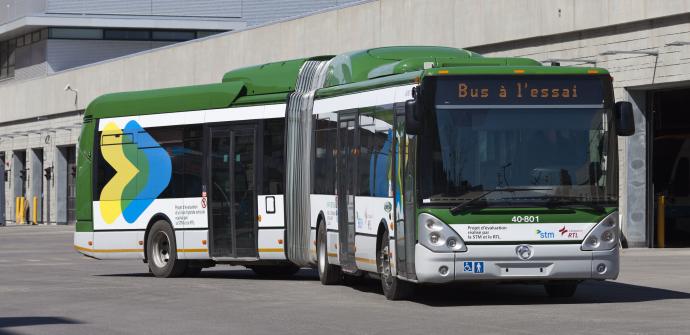Société de transport Montréal (STM) and Réseau de transport de Longueuil (RTL) are publishing the results of a joint technological project, during which they conducted a comparative assessment of the Citelis Hybride, a hybrid diesel-electric articulated bus from European manufacturer Iveco Irisbus, and the diesel drive articulated bus produced by Nova Bus.
STM and RTL release the results of their joint efforts
Société de transport Montréal (STM) and Réseau de transport de Longueuil (RTL) are publishing the results of a joint technological project, during which they conducted a comparative assessment of the Citelis Hybride, a hybrid diesel-electric articulated bus from European manufacturer Iveco Irisbus, and the diesel drive articulated bus produced by Nova Bus. Assigning the Citelis Hybride to passenger service also helped determine its potential for fuel savings and, by the same token, any reduction in greenhouse gas emissions.
“Thanks to the close cooperation of all partners, the technological assessment project was quite successful, particularly in terms of energy gains,” stated STM chairman, Michel Labrecque. “Indeed, hybrid technology makes it possible to lower fuel consumption by about 37% in urban settings like Montréal, compared to a standard drive, which also translates into a proportional reduction in GHG emissions. Furthermore, the project enabled us to learn more about this new hybrid drive technology, identical to the one chosen by transit operators in Québec, as part of a recent call for tenders to procure standard hybrid buses, a process steered by AVT (Société de gestion et d’acquisition de véhicules et systèmes de transport).”
“This project presented the RTL with an excellent opportunity to become more accustomed to hybrid buses and the company jumped at the chance. Road-testing enabled us to learn more about driving and operating the bus, its reliability and the appeal it holds for both customers and employees,” indicated Caroline St-Hilaire, RTL chairwoman and Mayor of Longueuil, adding that “Results of road-testing have fulfilled our expectations and met our goals in terms of “going green,” most notably through a significant reduction in the environmental footprint of our activities.”
“Cooperation between IVECO BUS, Québec’s public transit companies and AVT was truly successful, in both human and technical terms. The fuel consumption results we obtained were quite good and consistent with data collected from our fleet operating in Europe. Each operational IVECO BUS hybrid diesel-electric articulated vehicle avoids releasing 37 tonnes of greenhouse gases, per year, into the atmosphere! We are delighted to see that Québec is tackling the hybrid challenge – their strategy is in line with ours, » added Pierre Lahutte, IVECO vice-president in charge of Bus activities.
A summary report of the technology’s assessment is available on the AVT (www.gestionavt.com), STM (www.stm.info) and RTL (www.rtl-longueuil.qc.ca) websites.
STM’s portion of the project
Testing by the STM covered a period of four months, from May 7 to August 31, 2012. Its purpose was to measure the overall performance and environmental impact of operating a series Citelis Hybride hybrid diesel-electric bus under summer conditions. During the same period, control buses used 82.5 litres per 100 km, which points to a fuel savings of 31.5 litres per 100 km, or 37.5%, for the Citelis bus. The European vehicle was paired with a bio-diesel drive articulated bus that served as a control vehicle. They both travelled some 2,050 km, weekdays, on the same routes already served by other articulated buses, namely the 80 / 435 – du Parc, 139 / 439 – Pie-IX, 69 – Gouin, 100 – Métropolitain, 121 – Sauvé and 67 / 467 – Saint-Michel lines.
The results are comparable to those obtained by the Urban Transportation Showcase Program (PDTU) carried out in 2008-2009. A joint STM-STO project, the study aimed at assessing the potential for reductions in greenhouse gas emissions by hybrid diesel-electric buses used for public transit in Gatineau and Montréal. At the time, the buses were paired with same-generation, conventional biodiesel drive buses, that served as a control group, and travelled the same routes under variable weather conditions.
RTL’s portion of the project
At the RTL, testing took place from September 24 to November 2, 2012, under fall weather conditions. As with the STM, the road tests made it possible to assess the vehicle’s overall performance and the environmental impact of operating the series hybrid diesel-electric Citelis Hybride bus. As part of the project, the series Citelis Hybride bus was also paired with a control bus, in this case, a diesel drive articulated bus. Both vehicles travelled the same route, the 45 Express bus line running between the Panama and Centre-Ville (downtown) bus terminals.
During the six weeks of testing, the buses travelled some 8,201 km and their recorded fuel consumption was largely inferior to that of the reference bus. For the same period, the control buses used 46.5 litres per 100 km, a savings of 13.6 litres per 100 km, or 30.1%, for the Citelis, a spectacular result considering that hybrid drives do not perform at their best on an express route like the 45 Express bus line. Part of the fuel savings stems from technical differences between the hybrid drive from European manufacturer Irisbus-Iveco, subject to European standards, and the Nova Bus reference bus, although it was impossible to say whether it was because of the “Iveco” factor or the “hybrid” factor.

